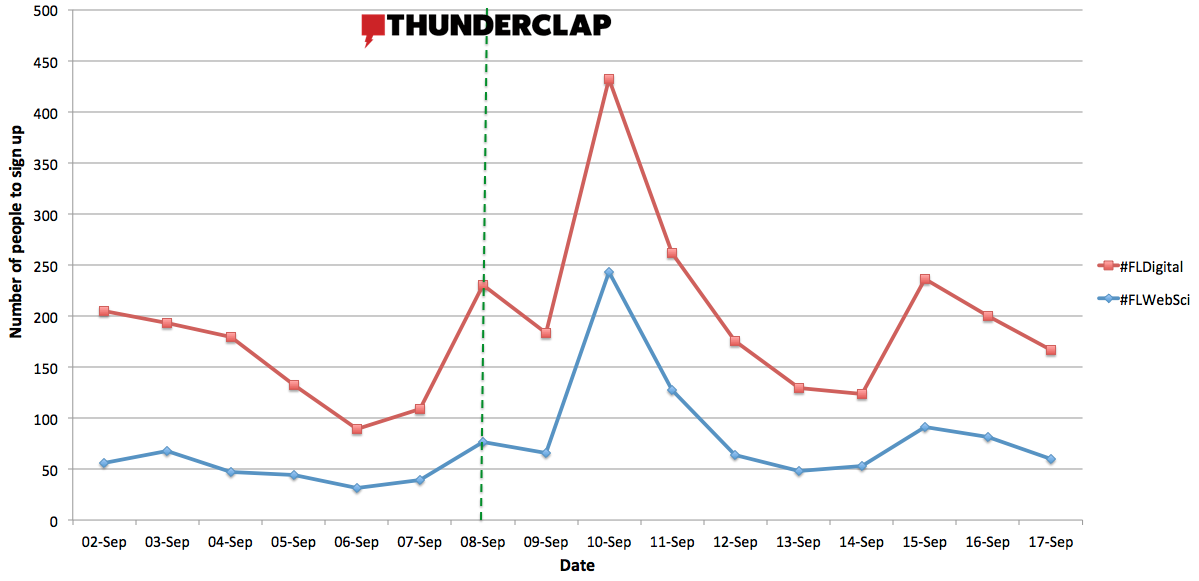Thunderclap – the results!
On 11th July (over 2 months ago – where has the time gone!) I blogged about our plan to set up a Thunderclap to help us promote the Digital Marketing and Web Science MOOCs.
We set the completion date/time for Monday 8th September at 3:30pm. As long as we got at least 100 supporters by that date then our Thunderclap would go live.
In the end we got 123 people to support it. The result was that we achieved a social reach of over 456,000 people. That means that 123 people helped us spread the word of free online education, and up to 456,000 people found out about it.
Particular thanks for such a massive reach must go to Cory Doctorow. Cory came here to the UK in July as a keynote speaker for the Web Science Summer School here at the university. A few weeks later I was sat here harassing people on Twitter to help us by supporting, when I tweeted him on the off chance that he might see it and support it. He did just that and added his 325,000 odd followers on Twitter.
If you don’t believe me, then please have a look at the page on Thunderclap directly!
So 456,000 people learnt about free online education. I mentioned in a blog post on the digi-champs website a few weeks ago that the big goal with the Thunderclap is to raise awareness of these courses.
In order to analyse the success of the Thunderclap we needed numbers. The message that was sent out was effectively a call to action to sign up to the MOOCs. Therefore we can look at the sign up numbers and see if there is a “bump” around when the message went out.
We can’t release the actual numbers of people who have signed up as a total, however the graph below is a representation of the number of new people at the end of each day.
The green line represents the day on which the Thunderclap went live. As you can see, both MOOCs experienced a surge on that day, followed on each by a slight dip. It is the next day however on which we see a huge surge of interest. This is perplexing me as I had previously theorised that we would see the spike on the 9th Sept – not on the 10th. My only two possible theories for this are that either Facebook Top Stories only really caught on that it was a Top Story 2 days later, OR that people were mulling it over for that time. Another surprise (looking at the overall patterns of both MOOCs is that they are actually fairly similar. Both have 3 peaks, and they are in the same regions.
The one thing that doesn’t surprise me is that the Digital Marketing MOOC has a higher interest rate across the time period that this data was taken. The Web Science MOOC is on its 3rd running now therefore there is going to be less interest generally than in the new one.
So where do we go from here?
I am in two minds as to whether we could do this kind of thing again. Part of me thinks that it is the kind of thing that if it gets overused then people will pay less and less attention to it. Added to that repeatedly getting people to support us would be difficult – there were several occasions where I was nervous that we wouldn’t reach our target. I think if we do this kind of thing again, it won’t be for a while. The precedent has been set and we will always be looking for new things to do with it. We also received some tips from the head of social media at FutureLearn which we will be putting into practice in due course.
In terms of the actual MOOCs, #FLdigital starts on 13th October. #FLWebSci starts on 6th October for its 3rd running!
Thanks to everyone who supported this! We genuinely could not have achieved such an incredible social reach without you!
My summer internship is finishing today here at the WSI however fear not! I am carrying on working here as part-time staff and I’ll be focusing on the WSI website and the MOOC activity. This certainly is not my last blog post – no-one gets rid of me that easily (evil laugh).
As ever you can follow me on Twitter (@WheelsOnFire92)!
Bye for now!
Alex Hovden

